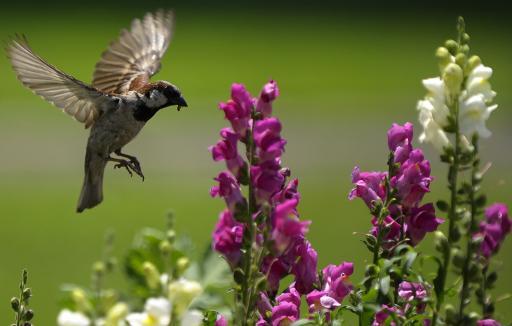Backyard bird feeders may ruffle some feathers, attracting aggressive breeds like house sparrows and doves while discouraging native species that eat insects and nectar, researchers said Monday.
The experiment described in the Proceedings of the National Academy of Sciences, a peer-reviewed US journal, set out to study how putting out seeds and bread may influence what kinds of birds inhabit certain areas, and if the hobby alters the birds’ natural balance.
“Bird feeding is happening on such a massive scale globally — it is essentially a worldwide experiment,” said lead author Josie Galbraith, a researcher at the Centre for Biodiversity and Biosecurity at the University of Auckland, New Zealand.
For a year and a half, scientists studied 23 residential gardens in Auckland, New Zealand. Eleven of the gardens contained bird feeders that were refilled daily with bread and seeds.The other 12 had no feeding stations for birds.
Scientists documented bird sightings with a total of 597 surveys that spanned more than 18,000 birds of 33 species.
They found that backyard feeders tended to favor non-native omnivores such house sparrows and spotted doves, as well as blackbirds and common myna.
“During experimental feeding, the feeding gardens had 2.4 times more house sparrows and 3.6 times more spotted doves -— both introduced species —- than non-feeding gardens,” said the study.
Homes with newly installed feeders saw a “dramatic” increase in the number of birds flocking to the feeder, and reported that the seed and bread was often gone in under two hours.
Meanwhile, diversity took a hit at feeding gardens, and the native grey warbler, whose diet consists mainly of insects, was seen less often where feeders were present.
The effects were temporary and reversible once the feeders were removed.
Bird feeding is common in the United States, Europe, and Australia.
New Zealand alone has about 265,000 homes that feed birds across six major cities, according to background information in the article, so the study focusing on just 11 bird feeding gardens was admittedly small.
But researchers urged avian enthusiasts to take a larger approach to welcoming birds, particularly those that naturally flock to fruit, nectar-producing flowers, and insects.
“We aren’t suggested feeding should stop — it may actually be very important for urban-dwelling people as it gives them a connection with nature, which in itself has many benefits,” Galbraith told AFP.
“We should be asking how we can encourage a diverse array of birds into our urban areas instead. Something everyone can do is create bird-friendly gardens by planting suitable trees and providing a water source.”
She also said that people who keep seed in backyard feeders should be sure to clean them regularly, because they can spread disease among birds.











